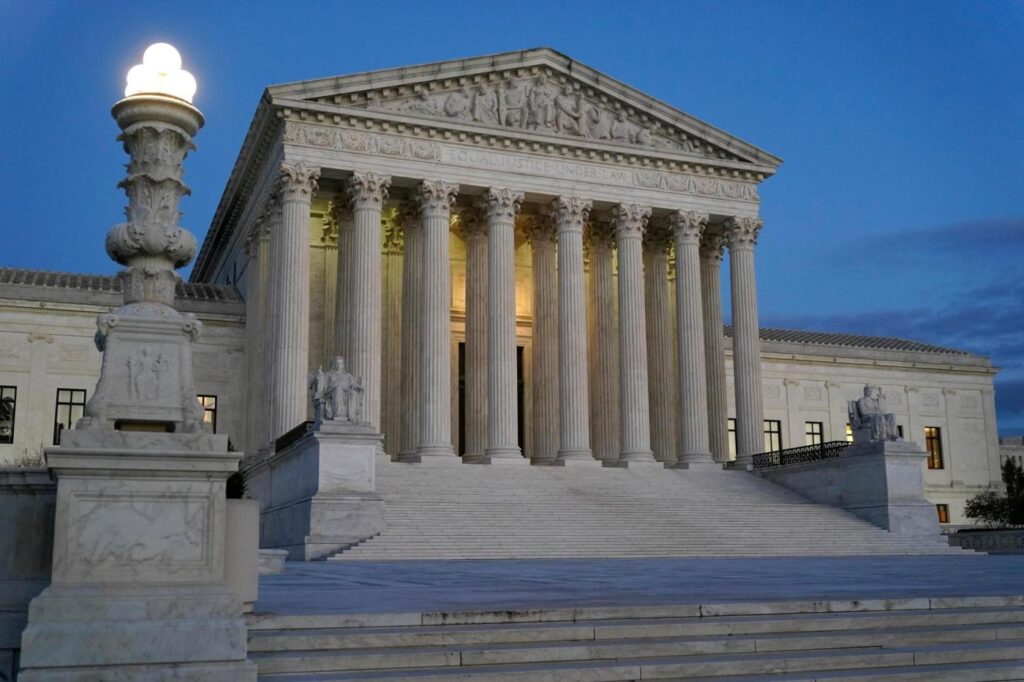
If the U.S. Supreme Court was hoping to stay out of election disputes, it’s too late now.
This year, the justices are hearing four cases that could directly or indirectly affect the outcome of the 2024 presidential race.
Back in December 2020, the Supreme Court declined to hear the case of Texas vs. Pennsylvania, in which Texas and other states asked the Supreme Court to temporarily prevent Pennsylvania, Georgia, Michigan and Wisconsin from certifying their election results. The lawsuit argued that courts and various election officials in those four states had made changes to election procedures that violated the Constitution, which says only the state legislatures may determine the “Times, Places and Manner of holding Elections for Senators and Representatives.”
The procedures at issue were such things as changing deadlines, relaxing signature verification requirements, adding new voting locations and installing ballot drop boxes, in violation of state laws.
The justices ducked the issue, declaring that Texas did not have “standing” to challenge the election procedures in other states.
But they’re not ducking now.
On Jan. 5, the justices agreed to hear former President Donald Trump’s appeal of the Colorado Supreme Court’s ruling disqualifying him from the ballot under Section 3 of the Fourteenth Amendment, ratified in 1868 following the U.S. Civil War.
Section 3 bars certain former officials and officers from holding certain federal offices if they engaged in “insurrection.” Whether it even applies to the president or the presidency is disputed by legal scholars, and neither Trump nor anyone else has been charged with the crime of “insurrection.” Regardless, there are dozens of these ballot disqualification lawsuits in multiple states. The Supreme Court will hear oral arguments on Feb. 8.
The justices also agreed to decide whether the government can muscle social media companies into censoring and deplatforming certain individuals and conversations. On Oct. 20, the justices said they would review Murthy v. Missouri, previously known as Missouri v. Biden. Evidence presented to lower courts has already convinced four federal judges that the U.S. government was engaging in conduct that likely violated the First Amendment. U.S. District Judge Terry Doughty issued a preliminary injunction— on the Fourth of July — ordering the government to knock it off.
But instead of denying it, the Biden administration appealed, saying it needed the power to prevent Americans from hearing “misinformation” while the trial proceeds. Now the case is before the Supreme Court, where the justices have agreed to decide not just the matter of the injunction, but the underlying case itself.
In yet another case that could affect the election, the Supreme Court got involved by not getting involved. On Dec. 22, the justices turned away a request from special prosecutor Jack Smith to speed up consideration of Trump’s claim of presidential immunity from prosecution for official actions. Smith has charged Trump with four felonies in connection with his actions on January 6, and he wanted a quick answer, but he didn’t get one.
Trump was scheduled to go on trial in this case on March 4. That’s not at all likely. Along with the presidential immunity case, there’s another relevant case pending, arguably even more significant.
On Dec. 13, the Supreme Court agreed to hear Fischer v. United States. The justices will decide whether the U.S. Court of Appeals for the D.C. Circuit was wrong in the way it interpreted and applied a law that prohibits anyone from corruptly obstructing an official proceeding.
If that sounds familiar, it’s a felony frequently charged by the Biden administration’s Department of Justice prosecutors. It has lengthened the prison sentences of hundreds of people arrested for their actions at the U.S. Capitol on Jan. 6. It is also the basis for two of the four felony counts in the case against Trump.
The law is 18 U.S.C. Section 1512(c)(2), and the question before the Supreme Court is whether it was violated by the people who went to the Capitol and allegedly or admittedly tried to stop the “official proceeding” of certifying the 2020 election.
Section 1512 is a provision of the Sarbanes-Oxley Act of 2002, passed in response to financial and investment scandals. These included the bankruptcy of Enron, an energy company that once had $60 billion in assets and then collapsed amid what the Encyclopedia Britannica gently describes as “a series of events involving dubious accounting practices.”
The law made it a very serious crime to tamper with evidence used in an investigation. Section 1512(c)(1) states, “Whoever corruptly alters, destroys, mutilates, or conceals a record, document, or other object, or attempts to do so, with the intent to impair the object’s integrity or availability for use in an official proceeding; or….”
And then Section (c)(2) adds, “otherwise obstructs, influences or impedes any official proceeding, or attempts to do so, shall be fined under this title or imprisoned not more than 20 years, or both.”
Federal prosecutors and judges have locked people up for long sentences by interpreting that law, which clearly is about tampering with documents and other evidence in an official investigation of financial crimes, to apply to people like Joseph Fischer. He was charged with “civil disorder,” “assaulting, resisting or impeding certain officers,” “entering or remaining in a restricted building or grounds,” “disorderly conduct” and “parading” in a restricted building. And he was also charged with violating Section 1512(c)(2).
U.S. District Judge Carl Nichols dismissed the 1512 count, but an appellate court reinstated it.
Now the Supreme Court has agreed to decide whether that law can be applied to “acts unrelated to investigations and evidence.” The decision could mean that hundreds of people were wrongfully prosecuted for “corruptly obstructing an official proceeding.”
So that’s four cases the Supreme Court will have to decide by the end of June, all of them potentially having a significant impact on the 2024 presidential race.
That’s what they get for trying to stay out of it.
Write Susan@SusanShelley.com and follow her on Twitter @Susan_Shelley
